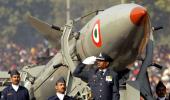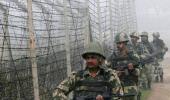 Pakistan's tactical nuclear weapons programme is not only dangerous for safety and security of the region, but also it is the surest route to escalating conventional war to the nuclear level, according to a report by an American think-tank.
Pakistan's tactical nuclear weapons programme is not only dangerous for safety and security of the region, but also it is the surest route to escalating conventional war to the nuclear level, according to a report by an American think-tank.
In its report 'Asia in the Second Nuclear Age', the Atlantic Council, however, said Pakistan does not appear to have operationalised its tactical nuclear-warfare plans yet.
'Pakistan's tactical nuclear-weapons programme is dangerous for safety and security reasons, and also because it is the surest route to escalating conventional war to the nuclear level. However, Pakistan does not appear to have operationalised its tactical nuclear-warfare plans yet,' said the report released this month.
The greatest threat in the region comes not from the development of large, sophisticated, and diversified nuclear arsenals, but from the continued stability of the institutions guarding them.
'In this regard, the future stability of Pakistan remains a wild card,' said the report.
In the last four decades, the Pakistani deep state’s pursuit of low intensity conflict in Afghanistan and India, via the vehicles of radical jihadi non-state actors, has produced terrible blow back effects on Pakistan itself.
Noting that both the Pakistani state and civil society have become the targets of terror attacks, it said some of the attacks have occurred, with insider help, on sensitive military bases where nuclear weapons are likely stored.
'The possibility that Pakistan’s nuclear weapons could be stolen -- or that schisms in Pakistan’s military might cause nuclear command-and-control failures -- is not as fantastic as it once seemed,' said the report.
Authored by Gaurav Kampani and Bharath Gopalaswamy, the report concludes that in the nuclear dynamic in the Indo-Pacific region, India and Pakistan are novice developers of nuclear arsenals; the weapons in their inventory are first-generation fission weapons.
Likewise, their delivery systems are the first in the cycle of acquisitions, the report said, adding that their hardware acquisitions generate outside concern because of the scope of their ambitions.
Observing that both nations plan to deploy a triad capability, the report said nonetheless, this ambitious goal and the selection of technologies underline the central lesson of the nuclear revolution, which is force survival (to enable an assured second-strike capability).
It said force survival through secure second-strike capabilities is also China's goal.
'It is the only nuclear power among the three that is actually modernising, ie, replacing aging delivery systems with newer and better designs,' the report said.
'Thus far, the evidence suggests that Chinese and Indian explorations of multiple-reentry vehicle technologies are aimed at reinforcing deterrence through the fielding of more robust second-strike capabilities,' the report said.
It said that this conclusion is also supported by the fact that neither India nor China has, nor is developing, the ancillary intelligence, surveillance, and reconnaissance (ISR) systems necessary to execute splendid first-strike attacks.











 © 2025
© 2025